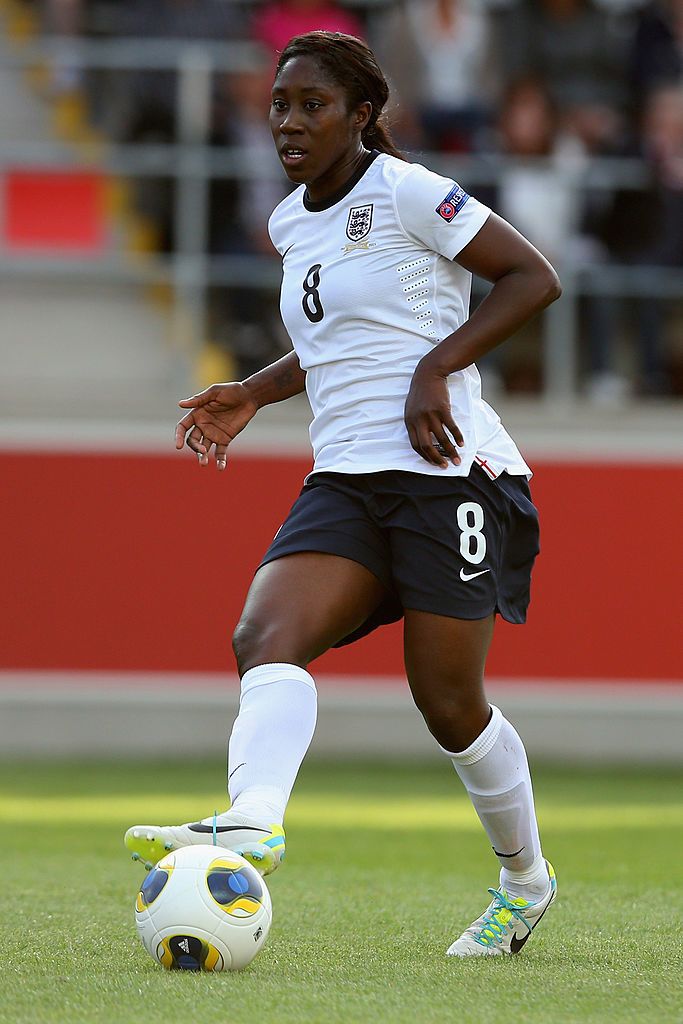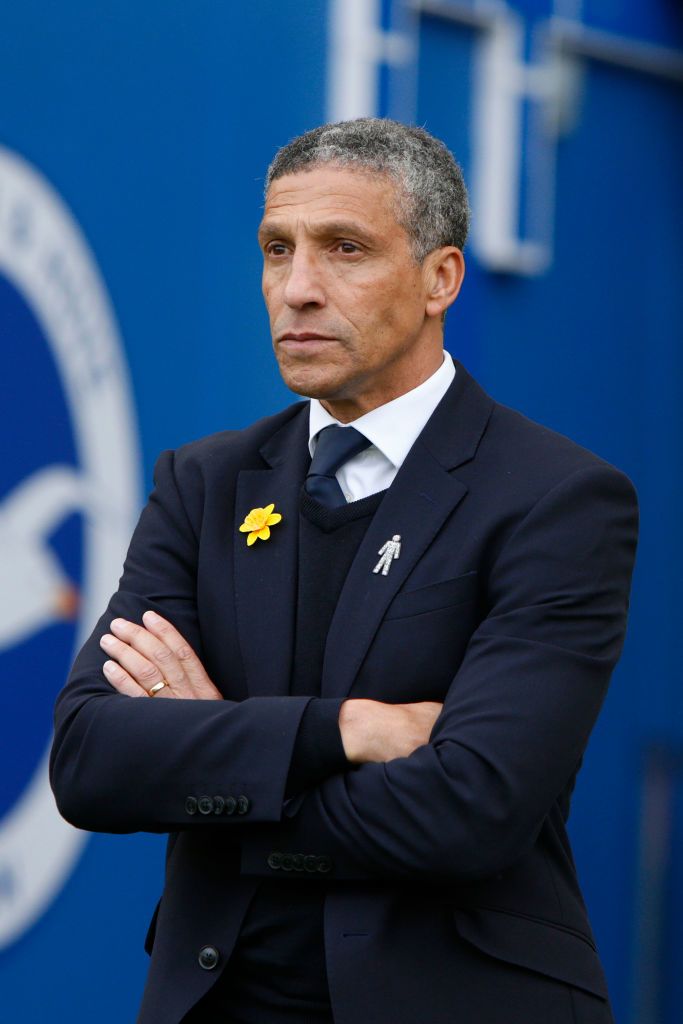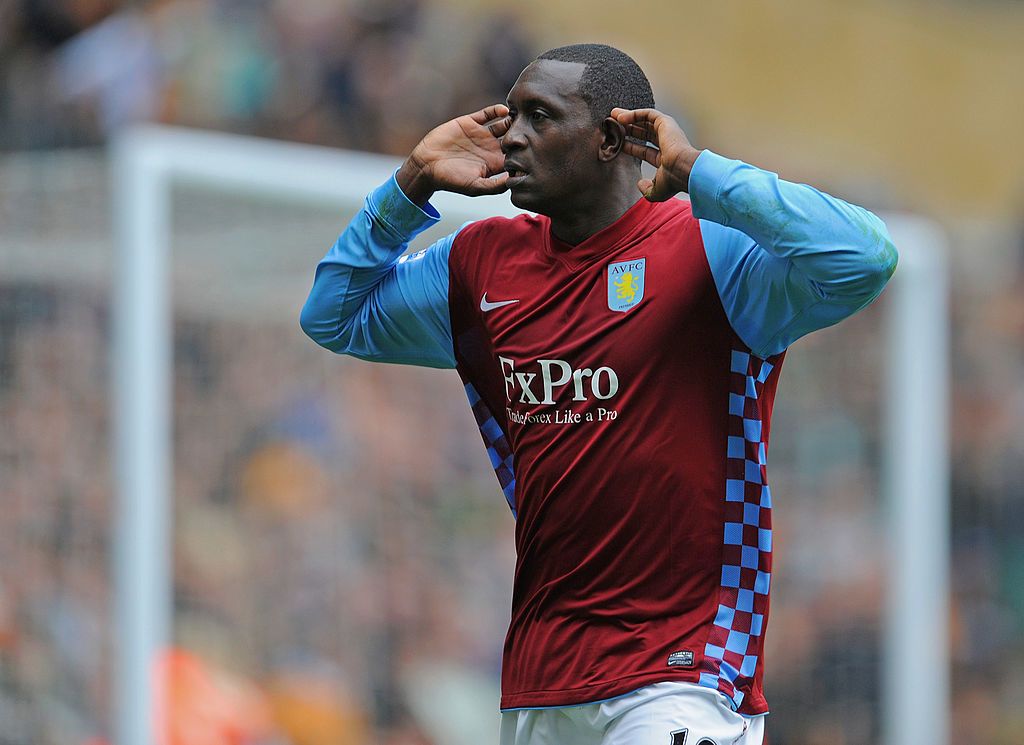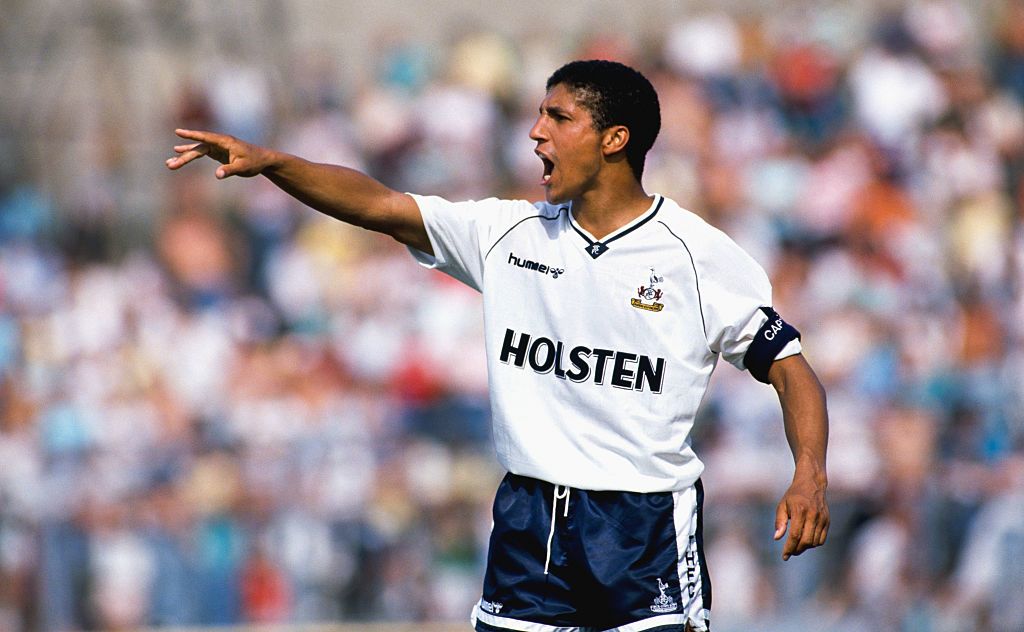

10 people share their experiences of racism across all levels of the game
Warning: this article contains offensive language
Emile Heskey
Former Liverpool, Leicester and England striker
I would have been about 13. I got chased from a Leicester City football match, from the Leicester City stadium by a Leicester City fan back to the town centre. And I'm a young kid. He's calling me a black this and that. I don't know what he is going to do to me, he definitely wasn't going to hug me.
Being brought up in the 1980s you had to know your surroundings, what’s around you, whether to cross the road, what to do. It takes away your innocence. I shouldn’t have to be thinking about what side of the road I’m going to be walking on and whether I need to go down that road, or not to go to the football.
I played for the England team at under-16s and went to Ireland and got spat at and called the ‘N word’. So we’re all coming through the tunnel and you know it’s hostile – but these are kids doing it. That was probably the first on that sort of level.
I grew up in a different era. My kids grow up with a different mind-set of ‘no I’m not having this, we’re getting together, we’re going to walk off the pitch'. In essence we just had to take it and at the end of the game lodge a complaint and take it further along the chain that way. If I was to play a game now I don’t know if I would actually walk off a pitch because it just wasn’t there for me so I still have that mind-set of 'no, I’m going to show you, I’m going to beat you'.
The toughest thing for a black player coming through the ranks and then making it, is how you’re perceived in the black community and that role model that you’ve got to present yourself in a certain way. That was tough for me because I knew that I was representing a community, so if I did something wrong it was a whole community that would suffer not me.



Anita Asante
Aston Villa Women and England defender
When you’re young you don’t always understand the subtleties of language used around you relating to the way you perform, or what you do and say. It’s only when you get older, you start to reflect and think ‘that wasn’t cool’.
I have had players from different parts of the world, who come from a different historical cultural upbringing and haven’t understood the negative connotations of the language they use, or the referencing to other communities or music, saying a certain word from a song around people from my community. There’s a lack of recognition that it might make me feel uncomfortable because I am the only one in that space and being the only one in that space makes it difficult to challenge some of these situations. You really want some allies around you to say ‘maybe you should check yourself, maybe you should rethink singing that word on the bus or the locker room’ – it’s a small thing but it has a deep impact.
Now, to be an African or from an African background is cool – in terms of popular music, it’s more in the mainstream. When I was at school it wasn’t cool, people would say ‘you live in trees’ – that’s what I’ve grown up with and you know from an early age there are certain challenges you face that your peers don’t.
When you read or hear stereotyping about black female or male athletes or other ethnic backgrounds it's mentally draining – it’s like doing mental gymnastics. You have to check yourself to make sure people don’t view you in that light. Maybe on that particular day in a training session, I am that sassy person, or a I am that competitive person that comes across a bit more feisty – but because there is an association with being a black woman and having that energy and boldness is not always seen a positive thing, I might refrain from being that person and contain more of my emotions. That’s what I think is a sad thing because you don’t want any individual to feel they can’t be 100% themselves in any given moment.
I want to feel that I can have my hair a certain way, or dress a certain way and be bold. I love my culture - the music, the fashion and I know other people around me enjoy it. I feel that other people can have freely that urban culture and black people have to check themselves with a culture that we created. That is something we need to look at - the way I wear my hair in general society, should not be policed in that way – it’s a part of who I am. It’s what I want to be appreciated for on and off the pitch.


Andre Gray
Watford striker
If players keep speaking up, it will always be in the minds that if someone gets caught, the repercussions will be stronger than they have been before.
This has been going on for hundreds of years now. I’m not going to sit here and say that everything's going to fix itself and people are going to stop, so much has happened between 2020 and the 1900s, but it’s a start. We’re in a different generation now, social media is everywhere and everything is on the television and you know about everything that’s going on – and hopefully that can help, but that’s yet to be seen.
Hopefully, we just keep pushing and people that do have a voice can keep pushing the movement and trying to make a change – I don’t think it’s for me and the people older than me. It’s for the younger generation that we try to help and not have them have to live through what we have in the same way my grandparents and everyone else’s grandparents have tried to do that for us.

Chris Hughton
Former Tottenham player and Brighton manager
As a player I experienced a lot of racism in the 1980s, particularly from the terraces, but it was something that existed in our game.
Has racism gone away? I don't think so. Racism slurs used to come with a bad result for the club. There is now a bigger vehicle for those to express it. Once, there were three incidents within half an hour of the game ending. Today, it comes through social media. That is something new to us. Twitter gives people a vehicle to show racism and vent anger.
You became hardened to the racism. You could let it affect you but then you were the only one who would suffer from it. The mentality was always that you had to be thick-skinned, you had to get on with it. If you wanted a career in the game, you had to be better than them and better for it.
The hardest bit for me to accept - even with all the years I've been in the game - is that somebody, an older or younger individual, would racially abuse somebody because of the colour of their skin. The thought process for somebody at the receiving end of that is incredibly degrading. But until you see more people of colour involved in the visual aspects of game, at higher positions - board level, director level - it will continue to be more difficult.
Our game is a reflection of society and we have seen racism in society and it's about society changing as well as football.



Rimla Akhtar
The first Muslim woman to sit on the Football Association Council
I have gone to games for almost 20 years. I would never go to a football match on my own; I would always go with one of my brothers. When I first started going I agreed with my brothers and my mother that I would remove my hijab when I got to the stadium and I would wear a baseball cap and a scarf around my neck to cover me in a way that I felt comfortable but also in a way where I blended in and we felt that my safety wouldn’t be as compromised.
It was around 2005 after going to Istanbul, and being in Turkey, it changed things in terms of the environment we were in and I came back and I thought I can’t do this anymore, I can’t live this double life. I needed to be myself in the stadium and so we agreed that I would go with my hijab, that I’d be comfortable but be very wary.
But recently, just (last) season, I took my hijab off and put a baseball cap and a scarf on again because I went to a particular stadium where I thought I have to be extra careful. I’m going to watch a football game, I’m not going to let people stop me watching a football game, however, I need to be really careful and make sure that I don’t create a situation.
Football for me was a really safe space where I felt that despite everything that was going on around me, the height of racism in the 80s and 90s, I found a place where I was accepted for just my ability on the field of play.
My work has been to champion inclusivity not just at the FA council level but the entire organisation right down to the county FAs.


Shaakir Uddin
Referee and secondary school teacher
Sometimes racism is felt, not just through words but through actions, the way people look at you as well. On the pitch I've had racism - some quite extreme from players or managers. It didn’t feel good, I wouldn’t wish it on anyone. It did make me feel low. But I had to rise above it and not stoop down to their level at all.
I was refereeing a game and was being observed as well. I sent a player off and he called me an effing P***. I was quite taken aback by it. It was my first year in refereeing and I thought, 'is refereeing actually like this, what’s the point in carrying on? Why should I come out on a cold winter’s day and take this abuse?' Luckily the observer heard it as well. Unfortunately, the players denied it. I called the captain over and said 'you heard what he said and I will be reporting it'. But they continued to deny it and said it wasn’t aimed at me - but I was the only Asian on the field. I started doubting myself, but I was certain in my mind what he had said. The observer heard it as well and at the end of the game we spoke about it and I put a report in.
Luckily I did have him there on the day but what if he wasn’t there? What would have happened? It would have been my word against his. I was shocked, I still am shocked, at the players on the pitch, no-one would say a word against him.
I carried on with the game, but it was hard. Throughout the game, you’re doubting yourself, thinking did I make a mistake? Or, my next decision is a big decision because everyone would be on my case. They were all going to be nitpicking and I had to raise my standard and my expectations were much higher for the game. I think that is a shame. To come from an Asian background, I have to perform at a much higher level compared to a white person of the same age, same ability, same level as me because there is much more scrutiny.
At times you do feel isolated in the refereeing world. Because it is dominated by white male gentlemen there is no strong BAME support out there. The FA has supported me but there is no specific referee network. I am lucky that my family and wife supported me to get started in refereeing and I think it's important for families of different backgrounds to encourage their son or daughter to get into refereeing.



Lungi Macebo
Chief operating officer at Birmingham City
I’ve had many experiences. I turn up to a game at a certain entrance and I ask if I’m in the right place – and I’m asking innocently - but I do get that second look from the person who’s manning the door. Even getting to the door with a ticket in my hand I still get a funny look. I think even before people speak to me they assume I’m either there as the partner of one of the directors or as a footballer’s partner, rather than being there in my own right.
I’m still met with some surprising looks when people find out who I am, what I do and I think people are really sceptical about how I got to where I am and also whether I’m capable of doing the job or not. I’m almost having to prove myself constantly.
Football clubs can be quite traditional, in terms of HR being quite a modern business function. Part of the challenges that we had were actually going through a proper recruitment process for any role within the club. That became quite difficult when you’re having to constantly audit yourself, or constantly report on every single function that you’re carrying out, and I don’t think that it was about the principle itself but it was about the length of the process. It's just about educating the people that you work with in terms of the importance of actually doing that, be it for a BAME candidate or a non-BAME candidate and actually ensuring that you’re getting the best people in the role.
I implemented the Rooney Rule at Charlton. It was an EFL pilot in the first instance and then it was something that they introduced within all our academies. In terms of the challenges that I found with that, they were obviously wider than the Rooney Rule itself.



Coby Rowe
Sutton United defender
I went to get the ball out of the net and that’s when someone shouted at me ‘you black ****’ and I kind of lost my head for a bit and was being held back by a couple of people and Tom (coach) came on and we all just kind of decided to leave the pitch, we thought that was the best thing to do.
Someone grabbed me, I think it was Tom, I couldn’t really tell you, I was quite angry and said 'we’re going inside, we’re not going to carry on'.
During your normal job if you were at your office and someone was to say that to you, the person would be sacked. So just because you’re kicking a ball around a pitch for people to watch it shouldn’t be accepted at all. We're not surprised, we’re not shocked, it’s nothing new to us in our lives really.
I’m an Arsenal fan and if I was at a game and someone was shouting stupid stuff like that I’d stop them first of all, but secondly, as a fan you start telling people to get onto that person and tell them to shut up because if it's reported the game will get abandoned and maybe your team will lose points.
I went to a game when I was about 15 or 16. We played Swansea and won 1-0 and some old man was making gestures of ‘1-0’ to this bus that had a load of Swansea fans on it. He was a white guy and I was just stood next to him laughing and I wasn’t doing anything to egg him on and then about six or seven of them started doing gestures and making monkey noises to me. It’s always been about and it's still here.
I just try to be myself and tell as many people as I can to be nice to other people because I feel like that’s the only way people will change. I just try and be a good person, I try and help people and make them smile even if it’s just waving at a little kid in the supermarket. I just try and be a light when there’s a lot of dark in the world.



Reshmin Chowdhury
Journalist and broadcaster
I think people were very open to me and, if anything, I provided a bit of an education to people I met in Spain. One example was when I worked for Real Madrid TV. At Christmas they would give everyone a leg of ‘jamon’ - a leg of ham - and I remember saying to the boss ‘oh I’m really sorry, because I’m Muslim I don’t eat ham’ and they couldn’t understand that concept.
‘But it’s jamon.'
‘I know but because I’m Muslim, we don’t eat pork…’
‘But it’s jamon.'
And I said ‘It’s the leg of a pig’.
And it was a real kind of cultural issue that they were just quite ignorant on certain things and they just needed educating.
Perhaps there’s people on social media who might not know that I worked at Real Madrid, they might not know that I’ve been interviewing the biggest names in world football for 12 years. So, when I’m doing something new, sometimes they’ll say ‘oh she’s there just to make up the numbers, diversity gone mad’ and it just makes me laugh because I have longevity. I’ve been doing this for so many years. If they were picking me because I make up the numbers then they would have done that years ago. I would have been the biggest star in sports broadcasting by now if that was the reason.
It’s funny, often Asian people are more likely to say ‘why don’t you go and make me some roti instead’ and you think ‘no actually I don’t want to make you anything’ and secondly it’s funny when it gets personal in that sense. You’d think that they would be proud to see one of their own but I feel like social media is a very toxic place. I give on social media but I give very little.


Sanjay Bhandari
Kick It Out chair
There were a couple of specific experiences of racism in the mid 1990s after a cup final. We got so used to going to Wembley that I knew the quick ways out to get to the tube having watched the team lift the trophy. We went out, found a shortcut with my friends and then we ran into some opposition fans who said ‘Oh look it’s a P Manc’ and then threw their chicken dinner and their coffee over me. I was with three friends - all white - and actually they did the right thing which was to not to kick off and start a fight but to protect me and look after me and see how I was feeling.
In the same kind of period I had an incident at Wembley supporting England at the Scotland game during Euro 96 where you had quite a significant stand of people singing ‘I’d rather be a P than a Jock’. The only way you can react to that is to treat it as a joke and say ‘yeah same here, so would I’ and make people laugh but actually inside that’s not what you feel, what you feel is 'I can't believe that people are saying this'.
I think it’s got worse again over the last few years. As a Manchester United fan, it’s more at away games. I’ve noticed it would be because of the resentment of the difficulty of getting away match tickets. I’ve seen that a few times when I’ve had someone point to me and my nephew and say ‘how have THEY got tickets?’ because they’re thinking we’re tourists but actually that’s not the word that they’re using, they’re using the P word again to describe me and my nephew.
It makes me feel a bit powerless because I’m doing the sort of calculation of can I complain about this person? Should I complain about them? I'm also thinking about my personal safety, how far am I from the aisle? Can I get to that aisle? How many people are going to get thrown out? Am I going to be left to deal with all these other friends after the game and is that going to make it really uncomfortable for me and my nephew?
I am a fan, and while I won’t have had the experience that a player will have had of racism on a pitch, I’ve had my experience of racism in life and on the terraces. So I definitely want to work with the players. The players can be a really massive active force for good and I would love to work with the likes of Raheem Sterling and Ian Wright and former players because I think they’re the catalyst for change.


Written and produced by Kate Kopczyk and Miriam Walker-Khan
Photos: Getty Images, PA, Rex, Birmingham City FC, Dana Roesiger and Kevin Blankenship
Editor: Jon Buckley
Sub-editor: Peter Scrivener
Special thanks to Hannah Lupton, Jeremy Betts, Rasheed Speede, Sanj Shetty, Alistair Magowan, Phil Dawkes, Sam Chadderton, Neil Smallburn and Kate McKenna